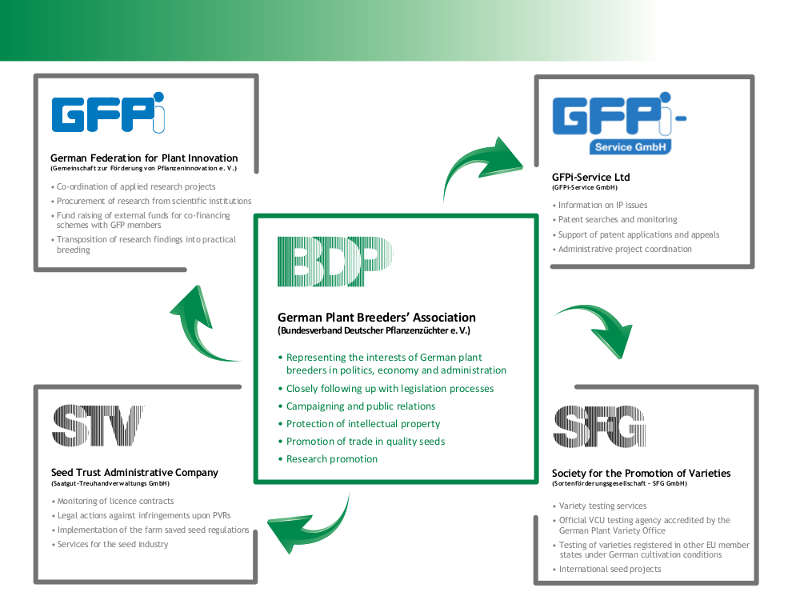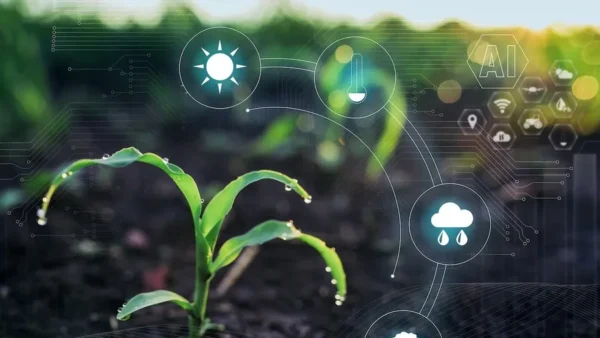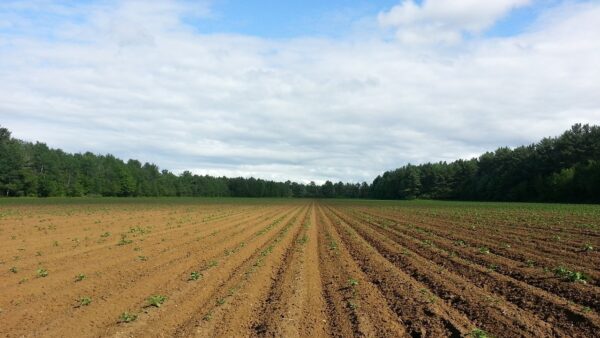A hundred-and-fifty years young and highly active, the German Plant Breeders’ Association is as relevant as ever.
Plants are the basis of our life. They are essential for the provision of healthy food in sufficient quantities, for our wellbeing and for future energy supply. One-hundred-and-fifty years ago, the Augustinian friar Gregor Mendel discovered the principles governing the way the hereditary information is handed down to subsequent generations. Since then, plants with certain properties have been developed by means of targeted crossing and selection of the offspring with the desired qualities.
In this way, every year new plant varieties are being created with continuously improved traits. Gregor Mendel’s discoveries gave rise to the modern plant breeding sector. They have continued to shape the work of the plant breeder up to the present day.
In 2016, the 150th anniversary of Mendel’s discoveries, the German Plant Breeders Association is celebrating this with various actions and events in order to raise public awareness of plant breeding issues.
Diversity is the hallmark of German plant breeding. Germany includes a large number of prospering plant breeding enterprises, and it is these enterprises‘ continued output of ever-improved plant varieties that account for Germany’s place among the leading plant breeding nations in the world. The German plant breeding sector features a worldwide uniquely diversified structure. Some 130 companies are active in plant breeding or in trade with seeds of agricultural and horticultural crops, 58 with their own breeding programmes. The plant breeding enterprises and their highly qualified staff are the epitome of innovation.
The German Plant Breeders’ Association (BDP) is a registered association seated in Bonn and Berlin. It represents the interests of the plant breeding and seed trading companies in Germany. BDP is a non-governmental, non-profit organization. Membership is voluntary. BDP is exclusively financed by the contributions of its 130 member companies.
BDP voices the interests of its members and offers them consulting services. BDP is the accepted contact for industry, science and politics. The focus of BDP is on optimizing the framework conditions for the plant breeding and seed industries, especially the effective protection of intellectual property; the organization of plant breeding research; the promotion of new breeding technologies; and the improvement of legislation on plant variety protection and seed marketing.
Crop-specific issues are being dealt with in potato, sugar beets, cereals, oil and protein plants, maize, various vegetables, forage plants, grape vine and ornamental plants. In addition to these, there is also a trade section and a section on biotechnology.
The highest decision-making body of the German Plant Breeders Association is the General Assembly of all member companies — both plant breeding and seed trading companies. The General Assembly elects the board of directors, the president and the vice-presidents. The president is the highest representative of our association.
The BDP Network
The German Plant Breeders’ Association is primarily committed to servicing its members. To this end, the following subsidiary organizations form a platform for joint approaches in pre-competitive research partnerships, patent issues, official seed testing and implementation of plant variety protection rights.
The German Federation for Plant Innovation (GFPi) is a non-profit association with more than 60 mostly small and medium-sized member companies which are either active in plant breeding or deal with plants or plant products along the entire agricultural or horticultural value chain. GFPi promotes innovation in plant research. GFPi takes the role of a catalyst initiator and facilitator for research co-operations at the national and international level. With a view to enhancing awareness of the importance and necessity of plant research, the members and committees of GFPi regularly set up suitable research strategies.
As a mediator between science and economy, GFPi ensures that results of GFPi research projects will be transferred into practical application. GFPi initiates and facilitates primarily pre-competitive joint research projects and enables the transposition of research results into practical applications. Member companies interested in a specific research project of a scientist at a research facility will jointly support this project. Research results will influence the development of new plant varieties or will help improve the methodology in plant breeding, plant processing or plant research. GFPi acts as a mediator between public science and industry and carries out the respective administrative work.
Plant variety protection rights (PVP) are the driving force of breeding progress; they ensure adequate benefits from the breeders’ achievements by safeguarding his intellectual property rights. As in many other specialities, this protection of intellectual property is vital to re-finance the expensive research and development that is needed to develop a new plant variety. The plant breeding community has joined forces to set up an organisation entrusted with safeguarding these protection rights — the Saatguttreuhandverwaltungs-GmbH (STV) is acting on behalf of approximately 50 plant breeding companies to enforce plant variety protection rights.
The Sortenförderungsgesellschaft mbH (SFG) is a 100-per-cent subsidiary of BDP. SFG organises and facilitates statutory and evaluation trials of plant varieties.
SFG organises VCU testing on behalf of the German Plant Variety Office. In this function, SFG co-ordinates the provision of trial field plots by plant breeding companies and their subsequent remuneration for this service. The results of these trials are the basis for the decision of the German Plant Variety Office whether a plant variety will be listed in the German Plant Variety Catalogue (a pre-requisite for the marketing of seeds of this plant variety). The data are also used for the Recommended Plant Variety List.
Global Responsibilties
| As member of the European Seed Association (ESA), the German Plant Breeders Association contributes to voicing the interests of the seed industry in EU politics to the European Parliament, the European Commission and the Council of the EU. The International Seed Federation (ISF), seated in Nyon, Switzerland, is dealing with worldwide developments on the seed market. Via the members of the German Plant Breeders Association who also are represented by a national office in Brussels, our members are active contributors in numerous bodies of ESA and ISF. The German Plant Breeders Association sets up internal working groups in order to quickly inform its members on international developments and to voice German positions in international negotiations, e.g. in talks with the Food and Agriculture Organization of the United Nations; International Seed Testing Association; Organisation for Economic Cooperation and Development; United Nations Organization; and the International Union for Protection of New Varieties of Plants. |
Social Commitment
The plant breeding industry and its professional representation are particularly committed to actively contributing to public discourse. In 2002, a number of family-owned German plant breeding companies set up the Gregor Mendel Foundation as a public benefit organization. Its objective is to serve as a platform for public discussion on the importance and innovative power of plant breeding. The foundation’s mission is among others to give credit to, and to raise public awareness of outstanding merits in plant breeding. The “Gregor Mendel Award” is awarded to personalities who have actively contributed to the promotion of science or to the preservation of breeding diversity.
In April 2015 in Berlin, the Gregor Mendel Foundation awarded the Gregor Mendel Innovation Prize to Mahmoud Solh. The director-general of the International Center for Agricultural Research in the Dry Areas (ICARDA) was honoured on behalf of his team for their commitment to the rescue of plant genetic resources from the gene bank during the political unrest in Syria, making it possible to save the gene bank and to send duplicates of all seed samples to various gene banks around the world despite the difficult conditions prevailing during the civil war there, and so to preserve these unique resources for future generations of scientists and plant breeders.
Germany’s federal minister of agriculture, Christian Schmidt, praised the actions of the ICARDA team. He emphasized that gene banks are not museums of the history of plants, but instead form the basis for further development through breeding and agriculture.
The gene bank of ICARDA comprises one of the biggest collections in the world for barley, faba beans and lentils, and also for old types of hard and soft wheat. This collection is a unique resource for international breeding programs for the development of varieties that are tolerant of drought and resistant to diseases and pests, and which can also grow under changing climatic conditions. Mahmoud Solh and his team have been able to rescue the cultural legacy in Syria. The matchless achievement of having saved 150,000 samples of seeds had to be made known to the general public.
Key Concerns of German Plant Breeders
One of the key missions of the German Plant Breeders’ Association is to represent the interests of the plant breeding industry in politics and administration. With a view to the general elections of the Federal Diet in 2017, the plant breeders state their urgent requests for a framework that creates optimized conditions for plant breeding.
Plant variety protection and breeding exemption stimulate innovation and must remain the primary form of intellectual property rights in plant breeding. The German Patent Act limits patent protection to technical inventions. This creates a clear distinction, which should be harmonized within the European Union. The current legislation on farm saved seed royalty collection is unfair both to plant breeders and farmers and needs to be revised as soon as possible. This will also contribute to the plant breeders‘ future ability to continue their investments into research and development.
The access to plant genetic resources must remain unrestricted. Systems that ensure free access — e.g. the International Treaty of the FAO — are to be enforced. Plant breeders demand a pragmatic interpretation of the EU regulation implementing the Nagoya Protocol by the competent authorities, accounting for the specific situation of plant breeding. For the benefit of the world population, an exchange in plant genetic resources must remain possible. The documentation requirements incumbent on plant breeders are disproportionate, undermine the breeding exemption and jeopardize biological diversity.
Both on EU-level as in public discourse, we need a rational approach to new techniques in the plant breeding toolbox. Based on current legislation, politicians need to pave the way so that new breeding techniques can be used in practical breeding in the nearest future and without legal risks. Disproportionate regulation of the new techniques will cause a drain of scientists, know-how and companies to countries outside the EU where often the utilization of these new tools is already possible.
The time-consuming public and private research activities require a comprehensive long-term (i.e. continued for up to 15 years) research funding for this industry. This also includes pre-competitive research. The social relevance of plant breeding must find its correspondence in an appropriate and purposeful commitment of politics and public authorities.











